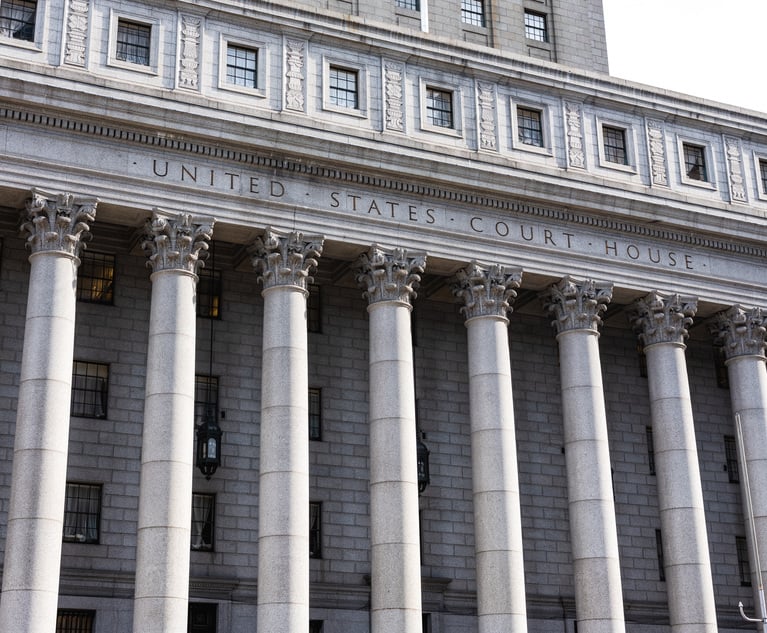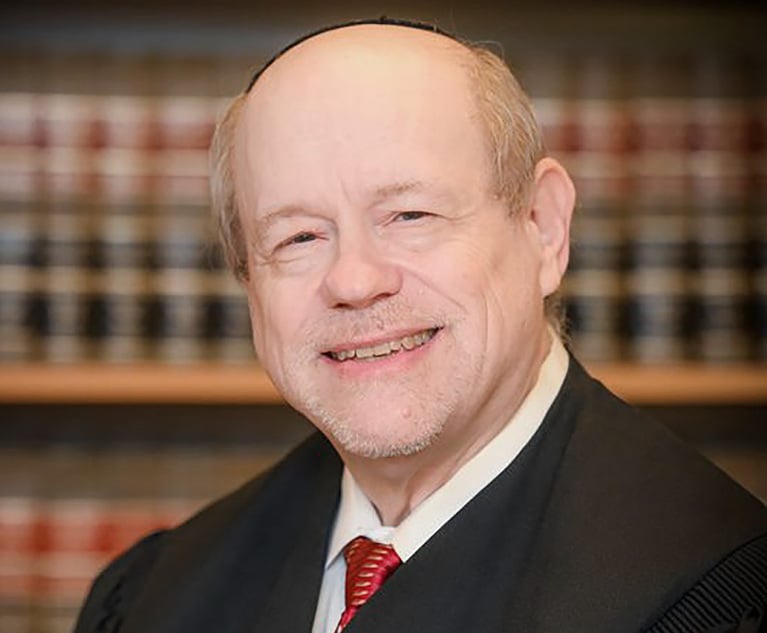 Anthony E. Davis and Janis M. Meyer
Anthony E. Davis and Janis M. Meyer A Fresh Look at Personal Interest Conflicts Involving Lawyers' Relationships With Other Lawyers
In their Professional Responsibility column, Anthony E. Davis and Janis M. Meyer discuss the meaning and scope of personal interest conflicts specifically in connection with lawyers' relationships with opposing counsel.
October 29, 2020 at 12:02 PM
9 minute read
A recent ethics opinion from the ABA Standing Committee on Ethics and Professional Responsibility, Formal Opinion 494 (Opinion 494) examines the meaning and scope of personal interest conflicts specifically in connection with lawyers' relationships with opposing counsel, a hitherto often overlooked component of Rule of Professional Conduct (RPC) 1.7. In this article we will discuss the principal conclusions in the opinion, and the lessons it holds for New York lawyers.
Personal relationships are addressed in Comment [11] to ABA Model Rule 1.7. New York addresses the issue in RPC 1.10 (h) which states that [a] lawyer related to another lawyer as parent, child, sibling or spouse shall not represent in any matter a client whose interests differ from those of another party to the matter who the lawyer knows is represented by the other lawyer unless the client consents to the representation after full disclosure and the lawyer concludes that the lawyer can adequately represent the interests of the client.
This content has been archived. It is available through our partners, LexisNexis® and Bloomberg Law.
To view this content, please continue to their sites.
Not a Lexis Subscriber?
Subscribe Now
Not a Bloomberg Law Subscriber?
Subscribe Now
NOT FOR REPRINT
© 2025 ALM Global, LLC, All Rights Reserved. Request academic re-use from www.copyright.com. All other uses, submit a request to [email protected]. For more information visit Asset & Logo Licensing.
You Might Like
View All
Decision of the Day: Qui Tam Relators Do Not Plausibly Claim Firm Avoided Tax Obligations Through Visa Applications, Circuit Finds

'Serious Legal Errors'?: Rival League May Appeal Following Dismissal of Soccer Antitrust Case
6 minute read
Decision of the Day: Judge Sanctions Attorney for 'Frivolously' Claiming All Nine Personal Injury Categories in Motor Vehicle Case

Law Firms Mentioned
Trending Stories
- 1Morgan Lewis Adds 4 IP Partners in Orange County, 1 in Seattle
- 2Delaware DOJ's Hume Is Named Newest Magistrate In Chancery
- 3Trade Wars: Five Tips for Legal Teams to Manage Tariffs and Trade in Trump II
- 4Balancing Attorney-Client Privilege With a Lawyer’s Right to Defend Against Allegations of Wrongdoing
- 5Public Interest Calendar of Events
Who Got The Work
J. Brugh Lower of Gibbons has entered an appearance for industrial equipment supplier Devco Corporation in a pending trademark infringement lawsuit. The suit, accusing the defendant of selling knock-off Graco products, was filed Dec. 18 in New Jersey District Court by Rivkin Radler on behalf of Graco Inc. and Graco Minnesota. The case, assigned to U.S. District Judge Zahid N. Quraishi, is 3:24-cv-11294, Graco Inc. et al v. Devco Corporation.
Who Got The Work
Rebecca Maller-Stein and Kent A. Yalowitz of Arnold & Porter Kaye Scholer have entered their appearances for Hanaco Venture Capital and its executives, Lior Prosor and David Frankel, in a pending securities lawsuit. The action, filed on Dec. 24 in New York Southern District Court by Zell, Aron & Co. on behalf of Goldeneye Advisors, accuses the defendants of negligently and fraudulently managing the plaintiff's $1 million investment. The case, assigned to U.S. District Judge Vernon S. Broderick, is 1:24-cv-09918, Goldeneye Advisors, LLC v. Hanaco Venture Capital, Ltd. et al.
Who Got The Work
Attorneys from A&O Shearman has stepped in as defense counsel for Toronto-Dominion Bank and other defendants in a pending securities class action. The suit, filed Dec. 11 in New York Southern District Court by Bleichmar Fonti & Auld, accuses the defendants of concealing the bank's 'pervasive' deficiencies in regards to its compliance with the Bank Secrecy Act and the quality of its anti-money laundering controls. The case, assigned to U.S. District Judge Arun Subramanian, is 1:24-cv-09445, Gonzalez v. The Toronto-Dominion Bank et al.
Who Got The Work
Crown Castle International, a Pennsylvania company providing shared communications infrastructure, has turned to Luke D. Wolf of Gordon Rees Scully Mansukhani to fend off a pending breach-of-contract lawsuit. The court action, filed Nov. 25 in Michigan Eastern District Court by Hooper Hathaway PC on behalf of The Town Residences LLC, accuses Crown Castle of failing to transfer approximately $30,000 in utility payments from T-Mobile in breach of a roof-top lease and assignment agreement. The case, assigned to U.S. District Judge Susan K. Declercq, is 2:24-cv-13131, The Town Residences LLC v. T-Mobile US, Inc. et al.
Who Got The Work
Wilfred P. Coronato and Daniel M. Schwartz of McCarter & English have stepped in as defense counsel to Electrolux Home Products Inc. in a pending product liability lawsuit. The court action, filed Nov. 26 in New York Eastern District Court by Poulos Lopiccolo PC and Nagel Rice LLP on behalf of David Stern, alleges that the defendant's refrigerators’ drawers and shelving repeatedly break and fall apart within months after purchase. The case, assigned to U.S. District Judge Joan M. Azrack, is 2:24-cv-08204, Stern v. Electrolux Home Products, Inc.
Featured Firms
Law Offices of Gary Martin Hays & Associates, P.C.
(470) 294-1674
Law Offices of Mark E. Salomone
(857) 444-6468
Smith & Hassler
(713) 739-1250






